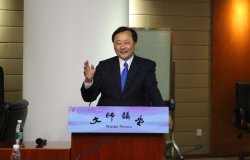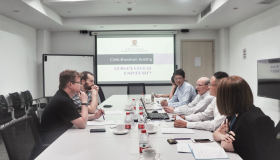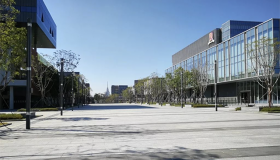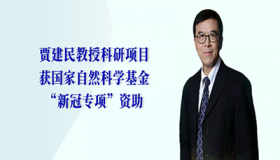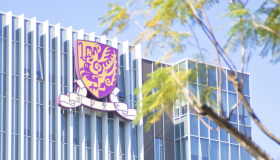On CIDE, Startups and Life with Dr. Eliot Gattegno
On CIDE, Startups and Life with Founder and Director of CIDE & School of Economics and Management professor, Dr. Eliot Gattegno.
By Grace and Layla
About CIDE
Many students are quite curious to know more about CIDE. What is CIDE’s mission and what does CIDE provide?
Our mission is to help students see beyond their current capabilities and reach more than they could have ever imagined. CIDE’s philosophy is to ask questions, treat each other well, and make things happen. CIDE offers creative hands-on courses and workshops to develop the knowledge and skills to do well and do good. Our research facilities and programs are designed to help students and faculty discover and develop breakthrough technologies. We offer internships with our industry partners to inspire insight and give students an opportunity explore the world. We also invest over three million renminbi to seed student startups while donating far more in the form of co-working space, lab usage, legal services, and meaningful mentorship.
Innovation, design, and entrepreneurship are broad concepts. Can you define them for us?
CIDE is intentionally all encompassing. CIDE gives students the opportunity to define for themselves. Students get to discover what these concepts mean to them, and then we give them an opportunity to connect them. CIDE doesn’t tell students what to think. CIDE trains students how to explore and discover for themselves.
Can you give us a brief summary of the workshops CIDE has held?
Our topics have ranged from Emotional Intelligence and Biotech Entrepreneurship to the fun Marshmallow Challenge. A prime example is our current design challenge. We feel that children learn best through play. But not all toys are created equal. For many children with special needs, such as those living with physical disabilities or learning challenges, playing with some off-the-shelf toys and games is not always possible. So we challenge students to ask the question of“How might we create toys and games that help children with special needs have a better chance of independence and success?”Students design and make toys and games that create opportunities for children with special needs to learn through play. They meet like-minded people from all over the world, and contribute their time, develop their tech skills and creativity to help make the world a better place for those less fortunate.
What is your next major event?
This December we are hosting an international innovation and entrepreneurship festival with the Shenzhen government. We are hosting distinguished professors from MIT, Harvard, Tsinghua and Peking University. They will be giving lectures, presentations of their work, and panel discussions.
I notice all the posters have the same style, letters without an image.
Our posters are one way CIDE shows what it cares about: content. Some posters show neat pictures to attract your glance but don’t do more than that. We would rather focus on what we are doing and why you might be interested.“Learn how to start a biotech company from a billionaire biotech entrepreneur…”If you are interested in biotech or being an entrepreneur, then there we go!
How to define whether a student’s project is good or bad and how to support them? And, how can we apply?
CIDE looks at projects potential for making positive change and impact. There are no“good or bad”projects. There are, however, projects that make sense for CIDE or don’t make sense for CIDE. Apply by sending CIDE an e-mail at cide@cuhk.edu.cn. Let us know about your idea, how you think it has the potential to make positive change and why you’re the one to make it happen. Also, make sure to let us know when you are available to meet. We meet all students to access their idea, and then make an actionable plan to realize them.
About Prof. Gattegno
You started your company when you were 21 and several others afterward. Can you tell us about these businesses and your personal experience and interests?
I have experience in a range of companies in sectors including automotive, real estate, food and beverage, retail, non-profits, and most recently a consulting role in a biotech startup, a venture capital firm, and a global supply chain and logistics company. But it is always the companies that you found early on that leave the deepest impression. For me, those were companies related to creativity, education, and technology. I founded my first company for the promotion of new music performance and education. For the following eight years I served as President of the organization–producing hundreds of concerts on four continents, earning numerous grants from prestigious foundations, establishing residencies at leading universities including Harvard, Stanford, and Columbia, and garnering a citation for dedication to the Arts via cultural exchange from the Brazilian Government. The second was a company I founded while a Fellow at Harvard University. We developed sonic analysis software that converted sound into musical score notation. Also, a Web site and APP to collect, manage and preserve information about the analyzed musical sounds. User-created data was available to users at all times at no cost via the “wiki”model. The data was searchable through custom filters–like those of a travel Web site–and employed a newly conceived poetic search engine. My most meaningful experience was founding and for two years managing a music school and concert series for severely abused and neglected children at The Home for Little Wanderers in Dorchester, Massachusetts. There I learned that a wellspring of innovation and inspiration can come from the most unexpected places.
What attracted you to this university?
The students. After I had visited last Spring, I was immensely inspired by the students curiosity. They had an insatiable appetite for learning and were zealous in the best sense of the word. When I met with the University leadership (Prof. Xu and Prof. Luo), I was blown away by the plan for CUHK(SZ) and immediately felt their warmth. Even though I had just arrived, it was like I was at home. It is an honor to be part of establishing CUHK(SZ) and founding CIDE.
You are teaching sophomores How to Start a Startup, how do you teach them? Do you show particular theories or more practical knowledge?
How to Start a Startup is a chance for students to apply the extraordinary academic education they are getting at CUHK (SZ). How to Start a Startup is a practical course. There are no papers, no tests, and no final exam. But How to Start a Startup, the most challenging class many students take. We use a flipped classroom model, meaning students experience all the lectures via video on their own time. Students apply what they are learning online in class. Students develop a prototype of a product or service, write a business plan, practice telling their company’s story in under 30 seconds, make a two-minute video about their business, and build a solid pitch deck. The class culminates with each team pitching their ideas to venture capitalists for the opportunity to get real investment. This semester in How to Start a Startup we have spun-off seven companies, have built and launched on the Apple App Store the first CUHK (SZ) student-built APP and have filed one patent.
What courses are you offering next semester?
I will teach How to Start a Startup again and offer a new course called Applied Imagination: Principles and Procedures of Creative Problem Solving. They will both be open to all students by interview, not by GPA. I will also offer a series of introductory workshops open to all students. Topics for workshops in 2016 include Introduction to Programming, Intelligent Hardware, Wearable Futures, and Biotech Entrepreneurship.
Have you figured out China and Chinese culture?
Considering that my in-laws are the most traditional Chinese family I have ever met in and outside of China, and I have sat with many business people in China while being cheered with vibrant“Gan Beis,”yes, I think I have figured out a few things about China and the Chinese culture. Over the years I have worked and taught in China, I have come to a thorough understanding of the crucial values students and parents hold and what kind of future they want. Not only do I want to help students make their dreams come true, but I also want to help them see beyond their current capabilities and do more than they could have ever imagined.“Talent hits the target no one else can hit; genius hits the target no one else can see.”
About Entrepreneurship
What’s the difference in the startup environment between Shenzhen and Silicon Valley?
Silicon Valley is a mature startup ecosystem with people from all over the world operating in a condensed region. Shenzhen is still young, and because of this unique position, it abounds with opportunities to become a defined global hub for innovation and entrepreneurship. Students have the chance to work with a high amount of risk capital and a relatively small amount of competition. They have the opportunity to be part of shaping an entire region and economy. If you are interested in innovation, design, and entrepreneurship, there are not many more exciting places to be than Shenzhen right now.
There’s a point of view in China that college students are too young to be entrepreneurs because they don't have enough knowledge and experience.
Every entrepreneur has to start somewhere in life. Whether it being at 18 or 58, it is never easy, and it takes years to realize an idea. The younger you start, the more time you will have. The world today is not what it used to be, especially in the creative industries. So age is not the most important factor. What is important is to have an excellent idea, product, team, and execution. If you have those, why wait?
How does starting a startup differ in China from the USA?
Regardless of location, when you are starting a startup, it’s good to dominate a niche. CIDE trains students to do this with a global mindset, meaning to start hyperlocal but focus on a problem that has a global impact. This way students will be able to thrive not only in China and the USA but around the entire world.
What is your advice for students who want to start up?
Only start a startup if you just can't do it. That’s the passion I wish to see. That's the dedication they will need to succeed. And when I see it, I put the full resources of CIDE behind the idea.
Do you think culture and environment matter in entrepreneurship?
Let’s start by specifying what we mean by culture. I think that you are referring to company culture. And if so, I’d suggest you read the article by Brian Chesky all my startup students read“Don’t fuck up the culture." Culture is something we take quite seriously. It’s why we interview students for our courses and don’t use GPA. It’s also why we keep our courses and workshops between 18-22 students. We want everyone to know each other well. This is the way the can best learn from each other as well as the instructors. On the environment, absolutely! Space creates behavior. CIDE’s spaces all encourage and foster experimentation. The WonderLab is a rough looking place. When you drop something on the floor or spill your drink, it’s no big deal.“Clean it up, learn from it and move on”- it’s a metaphor for everything CIDE believes and does.

